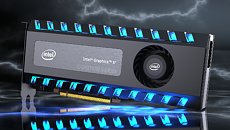- Joined
- May 14, 2004
- Messages
- 27,964 (3.71/day)
| Processor | Ryzen 7 5700X |
|---|---|
| Memory | 48 GB |
| Video Card(s) | RTX 4080 |
| Storage | 2x HDD RAID 1, 3x M.2 NVMe |
| Display(s) | 30" 2560x1600 + 19" 1280x1024 |
| Software | Windows 10 64-bit |
Several years ago, Ineda, a small startup from Hyderabad, India made headlines when they developed custom-design processors for use in wearable devices that were optimized for high energy-efficiency, while still having the ability to read out various sensors or listen to voice commands at the same time. Such improvements help increase battery life on devices that people don't want to recharge every day. Over the years the company has received several million dollars in funding from Samsung, Qualcomm, Imagination Technologies and others.
Looks like this caused enough attention at chip giant Intel, who's trying to come up with a competitive design for a discrete graphics processor, that's able to take on AMD's and NVIDIA's offerings. While Ineda certainly has patents that could come in useful, it looks like Intel is more interested in the company's manpower. With around 100 engineers, the company has a lot of talent, that's experienced in chip design and how to make these chips energy efficient.

Besides the obvious implications for mobiles devices, energy efficiency is the #1 constraint these days when it comes to graphics performance, since power generates heat, which requires bigger and more expensive heatsinks, and drives up fan noise levels. NVIDIA learned this after GTX 480, and has since made constant improvements in this sector, which is the foundation for their market dominance today.
Ineda Systems founder Dasaradha Gude used to be managing director of AMD India, which suggests some ties with Raja Koduri, who used to be head at AMD's Radeon Graphics department and moved to Intel not long ago, to start up their discrete GPU project. This makes us speculate that Raja, who's also from Hyderabad originally, was instrumental in making this buy-out happen.
Times of India reached out to Intel, which confirmed the all-cash purchase of Ineda, but didn't provide many additional details:
Intel has a lot of software development staff in Hyderabad, and is looking to expand that to several thousand engineers in the coming years. This is good news for the engineers, as they won't have to move, and it helps keep cost down because no relocations are needed.
View at TechPowerUp Main Site
Looks like this caused enough attention at chip giant Intel, who's trying to come up with a competitive design for a discrete graphics processor, that's able to take on AMD's and NVIDIA's offerings. While Ineda certainly has patents that could come in useful, it looks like Intel is more interested in the company's manpower. With around 100 engineers, the company has a lot of talent, that's experienced in chip design and how to make these chips energy efficient.

Besides the obvious implications for mobiles devices, energy efficiency is the #1 constraint these days when it comes to graphics performance, since power generates heat, which requires bigger and more expensive heatsinks, and drives up fan noise levels. NVIDIA learned this after GTX 480, and has since made constant improvements in this sector, which is the foundation for their market dominance today.
Ineda Systems founder Dasaradha Gude used to be managing director of AMD India, which suggests some ties with Raja Koduri, who used to be head at AMD's Radeon Graphics department and moved to Intel not long ago, to start up their discrete GPU project. This makes us speculate that Raja, who's also from Hyderabad originally, was instrumental in making this buy-out happen.
Times of India reached out to Intel, which confirmed the all-cash purchase of Ineda, but didn't provide many additional details:
Intel acquired engineering resources from Ineda Systems, a silicon and platform services provider based in Hyderabad. This transaction provides Intel with an experienced SOC (system on chip) team to help build a world-class discrete GPU business
Intel has a lot of software development staff in Hyderabad, and is looking to expand that to several thousand engineers in the coming years. This is good news for the engineers, as they won't have to move, and it helps keep cost down because no relocations are needed.
View at TechPowerUp Main Site




 Very Soon
Very Soon
